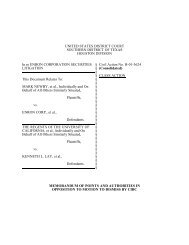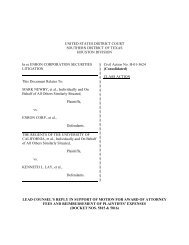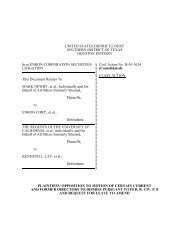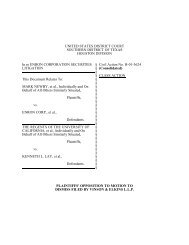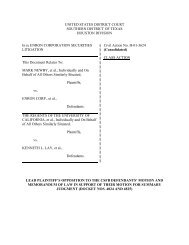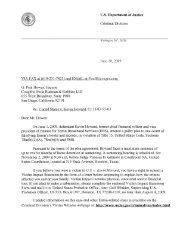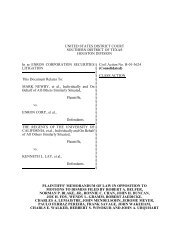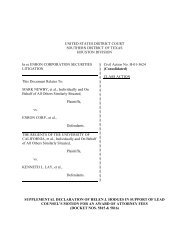Declaration Of Helen J. Hodges In Support Of Lead Counsel's ...
Declaration Of Helen J. Hodges In Support Of Lead Counsel's ...
Declaration Of Helen J. Hodges In Support Of Lead Counsel's ...
Create successful ePaper yourself
Turn your PDF publications into a flip-book with our unique Google optimized e-Paper software.
Plaintiff’s Opposition to Motion for Summary Judgment (Docket No. 5197) filed by defendants<br />
Merrill Lynch, Pierce, Fenner & Smith <strong>In</strong>corporated and Merrill Lynch Co., <strong>In</strong>c., which argued<br />
against summary judgment because Merrill Lynch committed a primary violation of the securities<br />
laws; <strong>Lead</strong> Plaintiff was entitled to a presumption of reliance; the evidence establishes loss<br />
causation; and there existed a triable issue of fact that Merrill Lynch was subject to joint and several<br />
liability. The opposition cited to 52 deposition exhibits, 4 core exhibits, 102 Bates-range documents,<br />
44 deposition transcripts and 10 expert reports. On January 26, 2007, Merrill Lynch filed the<br />
Supplemental Submission of Defendants Merrill Lynch, Pierce, Fenner & Smith <strong>In</strong>corporated and<br />
Merrill Lynch & Co., <strong>In</strong>c. in <strong>Support</strong> of their Motion for Summary Judgment (Docket No. 5359),<br />
which argued for summary judgment because plaintiff’s evidence failed to demonstrate a primary<br />
violation of the securities laws; Merrill Lynch did not cause the losses plaintiff sought to recover;<br />
Merrill Lynch was not jointly and severally liable for transactions in which it did not participate; and<br />
plaintiff did not rely on Merrill Lynch’s conduct. <strong>In</strong> response, on March 2, 2007, <strong>Lead</strong> Counsel filed<br />
<strong>Lead</strong> Plaintiff’s Response to “Supplemental Submission” of Merrill Lynch Defendants in <strong>Support</strong> of<br />
Motion for Summary Judgment (Docket No. 5465), which argued against summary judgment<br />
because Merrill Lynch committed a primary violation of the securities laws; the issue of Merrill<br />
Lynch’s joint-and-several liability was a jury question; and loss causation and reliance were present.<br />
The Court had not issued a ruling on the motion by the time the case was stayed.<br />
268. On June 26, 2006, Credit Suisse filed a motion for summary judgment (Docket Nos.<br />
4824, 4825), which argued for summary judgment because the FACC’s allegations concerning<br />
CSFB’s structuring of Enron transactions were false; discovery had disproved other allegations<br />
concerning CSFB’s work for Enron; the Court’s class certification order disposed of other claims<br />
against CSFB; CSFB did not commit a primary violation of the securities laws; loss causation was<br />
absent; and the claim for control person liability could not be maintained. On July 7, 2006, CSFB<br />
- 147 -



